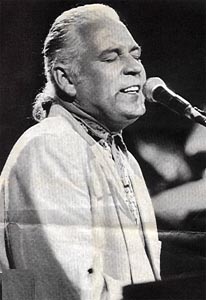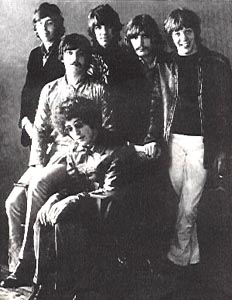

Procol HarumBeyond
|
|
PH on stage | PH on record | PH in print | BtP features | What's new | Interact with BtP | For sale | Site search | Home |
|
Nearly 25 years after their hit, Procol Harum is older, grayer and together again.
Written by Steve Dougherty and from London, Laura Sanderson Healy and Margaret Wright
It was, in the words of Beatles publicist, Derek Taylor, the "ultimate single" for the Summer of Love. With an organ line lifted from Bach's chorale Wachet Auf and hallucinatory lyrics ('We tripped the light fandango, turning cartwheels across the floor'[sic]), 1967's A Whiter Shade of Pale became the only No 1 hit by the British gothic rockers Procol Harum. Still a classic rock staple that has brightened the sound tracks of The Big Chill and even this year's The Commitments, 'Pale', like so many other memory triggers from the 60s, long outlived the fame of its creators, who broke up in 1977.
"That was a particularly depressing time musically," says the group's founder and haunting voice, Gary Brooker. "Punk started up, disco ruled, and it was the very anti the sort of thing we usually played. It was as good a time as any to just bow out." And so they did, after one last show on May 15, 1977 -- 10 years to the day after A Whiter Shade of Pale came out. (see here)
|
|
| Gary Brooker became "almost a slave to Procol Harum," he says. Freed, he spent "a few winters" in the Caribbean. | Original bassist David Knights (left), Brooker, Reid, Wilson, Fisher and Trower in their Whiter Shade of Pale prime. |
Now, 24 years beyond the Pale, Brooker and his graying bandmates are at it again. Joined by lyricist Keith Reid, 44, organmeister Matthew Fisher, 45, and guitarist Robin Trower, 46, Brooker, 46, has set a new batch of Reid's surrealist poetry to Procol's typically anthemic music and produced The Prodigal Stranger. The new album, dedicated to former drummer Barry Wilson (who died in Oregon in 1989, at age 42), has prompted an 11-city tour that opened in Toronto last week without Trower, who plans to join a second leg next year.
The reunion began taking shape two years ago after a sentimental phone call from Brooker in England to Reid at his home in New York City. Brooker had been composing ballet scores in recent years (his latest, Delta, premiered with the Royal Danish Ballet last December), but "I had a feeling that I wanted to go home, that I'd been away," he says. "And home was Procol Harum."
"It was late at night his time, and I think he'd been down the pub," recalls Reid, who had kept his hand in writing lyrics for other groups. "He said, 'Keith, let's get together and write some songs and make a new Procol Harum album.' I said, 'All right, get on the plane, come to New York, and let's see if we can write some songs.' It was as simple as that."
The pair were soon joined by former members Trower and Fisher, as well as session players who filled in on bass, drums and guitar. Reid hopes the reconstituted band will not only recapture Harum's old fans, but will have MTV appeal as well. "Every song of ours is a movie," he says. Brooker too sees their quirky lyric style as "a godsend to a videomaker. It's not like, 'Hey, come, baby, dance; let's go back to your place and rumpy-pumpy.' "
That, in fact, may be a better description of what rock-band life was like in 1967 when the late British impresario Guy Stevens first introduced Brooker, a Londoner who had played in an R&B cover band with Trower and Wilson, to Reid, a rock poet in search of a collaborator. After Fisher and founding bassist David Knights (who left the group in 1969) signed on, Stevens suggested the name Procol Harum, "having taken it from the birth certificate of his friend's pedigreed cat," Brooker says. In fact the cat's name was Procol Harun, meaning, roughly, "beyond these things" in Latin. Says Brooker: "when the band went to No 1, everybody said, 'What does it mean?' - as they still do. So we got hold of the certificate and saw the mistake. We misheard."
|
Fisher (right) met in London with Reid, who travels with the band but doesn't perform. | |
| On his current tour,
Brooker has Francoise, his wife of 23 years, along for
company. Curious use of upright dividers in these two photographs: note differing body-language in each |
|
|
In 1972, the band scored its only other [sic] post-Pale hit single with Conquistador. Finally, after 10 albums and as many years on the road, the band began to weary. "There were other things I wanted to be doing," says Fisher. "I always wondered why I was sitting in a hotel room watching an old movie when I could be at home doing something else." By 1977 they had broken up and gone in separate directions. Reid and Brooker left music for a time, Trower launched a solo career, and Fisher became co-owner of a recording studio. Over the years, "we weren't all in contact with each other," says Reid, "but between all of us, we were all in contact."
Now that the old group is new again, will the magic work a second time? "I've been hearing tunes played I haven't heard for 20 years," says Reid. "I think we've managed to stay sounding like us, yet not sound old-fashioned. It will be intriguing to see who comes to see us."
Thanks to Kerry Holloway for sending this article. He adds that it included four pictures with the following captions:
PH on stage | PH on record | PH in print | BtP features | What's new | Interact with BtP | For sale | Site search | Home |